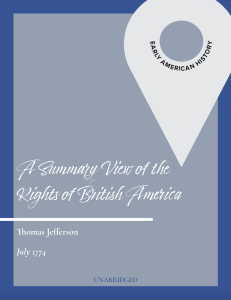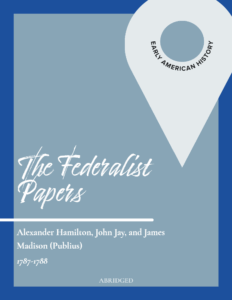
Government is the monopoly on legalized force.


Capital determines whether a society will be prosperous or poor, well-fed or not, populated by independent and self-reliant citizens or dependent subjects. An abundance of nutritious food, clean water, sturdy homes, safe modes of transportation, reliable sources of heat and power, modern medicines, and many other products and technologies that improve the quality of human life are impossible without capital.
A teacher can help students understand what capital is by encouraging them to think of capital as an individual’s “starter pack” for being productive and getting things done. Capital includes the tools, money, and other valuable resources a person needs to create something of value, or to solve a problem in order to create wealth.
For example, if you wanted to start a lemonade stand, the money you use to buy cups, lemons, water, and a sweetener is capital. While money is an important form of capital, capital can include other resources that help you create wealth for yourself by producing value for others.
Other Kinds of Capital:
Capital is anything you can use to “build” something that will provide experiences of value for other people. Money is the most obvious example of capital, but creativity, friendships, and even your honesty and intelligence, can be just as important, maybe even more important in some circumstances.
So, yes! Capital is cash and more: Capital includes any resource that helps you be more productive. Ask students: What kinds of capital do they have? Maybe it is their energy, ideas, or even their ability to make people laugh. Remind them that everyone—even people with little or no money—have important capital over which each person has much control: A person’s own reputation, honesty, and trustworthiness.
Evaluating incentives
One of the most important questions within any society is: Who will allocate capital? One possibility is that individuals choose whether, how, when, where, and why to spend their own money and invest their own capital. Another option is that political elites within government will tax citizens and confiscate the wealth that others have created, and then those in government will choose how to allocate other people’s their capital.
Individuals choosing how to invest their own capital have strikingly different incentives than politicians and bureaucrats in government spending other people’s money.
As we discuss in another section, profit is the happiness of other people. When individuals and business owners make their own choices about how to allocate and when to invest their own capital, they aim to earn a profit—they want a return on their investment—which is another way of saying they’re trying to make other people happy by producing value for them.
When those in government choose how to spend other people’s money, they serve their own interests, usually by expanding the scope and power of government. That is worth repeating: Business owners allocate their own capital in order to make a profit for themselves by making other people happy; government allocates other people’s capital in order to extend the power and control of government.
Every new government spending program, after all, requires expanding the class of unelected bureaucrats, adding new levels of control over what citizens may do, and adding new kinds of taxpayer-funded government competition to businesses and other private organizations.
Incentives of Allocation
For politicians and bureaucrats, resource allocation often means achieving political ends or aiming for short-term gains. Without direct knowledge of costs or profits, these decisions can be quite unpredictable.
When private individuals choose how to invest or spend their own money, they have strong incentives to make careful, strategic decisions. If they invest wisely, they personally reap the rewards; if they invest foolishly, they suffer the losses. This direct link between decisions and consequences encourages efficiency and accountability. Individuals are motivated to seek the highest return (or best use) for their funds, and they also bear the risk of losing their capital if a project fails.
By contrast, when those in government take capital from citizens through taxation, politicians and bureaucrats end up allocating resources that are not their own. As a result, several distortions can arise:
In short, when individuals allocate their own funds, they have personal incentives—financial risk and reward—to be careful stewards of their capital. When governments collect taxes and decide how to spend them, officials are allocating other people’s funds and often do so under weak or no incentives for efficiency, with less direct accountability for mistakes, and with political or bureaucratic considerations that can overshadow the goal of maximizing societal well-being.
 Nº1
Nº1
Description
Download PDF Download ePub Button 3
It’s important for students—and all citizens—to understand something fundamental: government is force. More precisely, government is the one institution with a monopoly on legalized force.
When individuals commit acts of violence—harming or violating the rights of others—they are acting outside the law, in violation of the law. A violent criminal, once caught, is arrested and charged precisely because society recognizes such private use of force as both wrong and unlawful.
Government is different. When a government seizes property, imprisons someone, or even takes a life, it usually does so backed-up by the authority of law. What would be considered a crime if committed by a private citizen becomes “legal” when carried out by the state. That’s what we mean when we say government has a monopoly on legalized force.
No business has the legal authority to arrest you, throw you in jail, or confiscate your money because you refuse their service. A business only offers various products or services as a trade that you are free to accept, decline, ignore, or negotiate. Government, however, can command payment—taxes—under threat of punishment. Refuse, and your property can be seized; persist, and you will likely be violently detained, arrested, and eventually imprisoned.
That’s worth repeating: government is the only institution legally authorized to point a gun at citizens and, in some cases, pull the trigger. That’s why wise and good citizens want few laws, not many. Every additional law extends the scope of government force and provides a reason for a law enforcement officer to point a weapon at a citizen.
In this respect, government is like fire: useful, even necessary, but inherently dangerous. This is why constitutions exist—to limit government power, define its scope, and make sure those who wield force remain accountable to the people.
The potential danger of concentrated government power has led to a sobering subfield in political science: democide—the study of governments that kill their own citizens.
The numbers are staggering. Consider the 20th century:
– In all military conflicts combined—World War I, World War II, Korea, Vietnam, and others—about 40 million soldiers died in combat.
– Civilians caught in the crossfire of these wars—so-called “collateral” deaths—numbered about 100 million.
– Yet, in that same century, governments murdered at least 200 million of their own citizens through purges, death camps, state-induced famines, forced relocations, and other “legal” acts of mass killing. That is democide.
According to Baylor College of Medicine and the World Health Organization, the leading causes of human death worldwide are heart disease, stroke, chronic respiratory diseases, infections, neonatal conditions, and similar health issues. For perspective: heart disease kills about 9 million people per year, strokes about 6 million, kidney disease about 1.3 million.
But those same institutions do not list death-by-government as a leading cause of death. If they did, the picture would be grim: over just the past hundred years, governments have slaughtered between 250 and 300 million of their own people. That would place government itself among the top causes of premature death.
The exact figures are imprecise because tyrannical regimes rarely keep meticulous death records. In places like the killing fields of Cambodia, researchers estimate casualties by digging up mass graves and extrapolating the numbers of dead from skeletal remains.
Democide takes many forms: gulags and death camps, political purges, executions of dissidents, forced relocations, mass famines caused by central planning, and even systemic collapse of essential services like hospitals. Each is a sobering reminder that only government possesses the legal authority to carry out such widespread violence—and often cloaks that violence in the mantle of law.
Government power is necessary; no civilized society can exist without some form of government and legalized force. But the same monopoly on legalized force that allows government to protect rights also gives it unique power to violate rights. It is not cynical to limit government power, keep government within constitutional boundaries, and remain vigilant as citizens; it’s wise.

